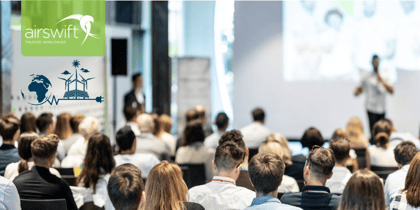AI in HR: Transforming the way we do business
July 13, 2022
- Home
- Blog

You may have heard that we are entering the fourth industrial revolution – a time when barriers between physical, digital, and biological sectors will be eliminated by Artificial Intelligence. And though a lot of us may be experiencing some Boston Dynamics level creep factor, it’s something that we must face and adapt to.
This seismic, cross-industrial shift will require leaders of all industries to reassess our roles, responsibilities, and the way we interact with the world around us. HR professional and recruiters will be at the centre of this change for many businesses. It’s therefore vital that industry leaders have a deep understanding of AI technologies and their implications.
The transformative power of AI in HR
The integration of AI within human resources marks a pivotal shift in the sector, revolutionising longstanding practices and enhancing the efficiency of HR operations. AI stands at the forefront of this transformation, automating routine tasks, enriching data analysis, and elevating the overall employee experience.
AI’s role in HR transcends mere efficiency; it signifies a profound evolution. Where once HR was characterised by manual processes and subjective decision-making, it is now being reinvigorated by sophisticated algorithms and machine learning capabilities. From talent acquisition processes to performance management and employee engagement initiatives, AI is facilitating a more streamlined, objective, and responsive HR function.
The adoption of AI in HR cultivates a dynamic environment, fostering data-driven decisions that yield superior outcomes. HR professionals are finding themselves better equipped to concentrate on strategic imperatives, employee development, and nurturing a positive organisational culture. Being supported by intelligent tools that adapt and learn in tandem with organisations make for a more comprehensive understanding of their workforce.
As we navigate this technological renaissance, the possibilities presented by AI in HR are limitless. The technology promises to not only automate but to innovate; not merely to analyse, but to enlighten. The future of HR is inextricably linked with the capabilities of AI, laying the groundwork for a more equitable, efficient, and engaged workplace.

How AI can be used in HR
AI-driven technologies are driving rapid change in recruitment, steering the industry towards unprecedented efficiency and precision. The transformative impact of AI on talent acquisition is streamlining processes and enhancing outcomes.
Crafting job descriptions with generative AI solutions
HR teams can now leverage AI-driven tools to craft precise and inclusive job descriptions tailored to attract a diverse pool of candidates. AI technology utilises natural language processing and industry-specific algorithms to recommend essential skills and qualifications, ensuring that the job listing accurately reflects the requirements of the role.
Assessing resumes using automation
AI-powered tools speed up resume screening and AI recruitment, using machine learning to assess resumes and rank candidates on their suitability for a role. These ATS (Applicant Tracking Systems) help recruiters shortlist candidates and reach out to the right people quickly. This not only accelerates the hiring process but also ensures a fair and unbiased evaluation of each applicant.
AI systems in recruitment benefit both recruiters and candidates. It allows them to perform screening assessments from the comfort of their own homes and track the progress of their application, so it’s always clear what the next step is.
Headhunting enhanced by predictive analytics
AI is fast becoming a strategic partner in talent acquisition, enabling recruiters to find the best talent faster and more efficiently than ever before.
Predictive analytics has also contributed significantly to the evolution of hiring practices. Using historical data, AI algorithms can predict the success of a candidate in a particular role, helping recruiters make more informed decisions. LinkedIn’s Talent Insights is a prime example, offering a comprehensive analysis of talent pools, helping recruiters identify trends, and make strategic hiring decisions.
Improving onboarding with AI-driven HR technology
AI is playing a pivotal role in streamlining and enhancing the onboarding experience, ensuring that new hires are engaged, well-informed, and ready to contribute from day one.
AI-powered tools and platforms are automating administrative tasks associated with onboarding, such as document submission and verification, freeing up HR managers to focus on creating a more personalised experience for new employees.
Virtual assistants and chatbots are being utilised to provide instant responses to common queries, helping new hires adjust quickly and unlock their true potential early on while also improving the productivity of the entire team.
Moreover, AI tools enable the customisation of onboarding programs based on the role, department, and individual needs of the new employee, ensuring that they receive relevant information and training. This tailored approach not only accelerates the learning curve but also enhances the overall employee experience, contributing to higher job satisfaction and retention rates.

Boosting efficiency: The impact of AI in HR operations
A study by McKinsey has found that the average lifespan of companies has dropped from 61 years in 1958 to just 18 years in 2016. Organisations that fail to swiftly adapt to the demands of technologically adept customers are finding themselves at a disadvantage.
With products and required skill sets evolving every two years, there is a pressing need for businesses to diversify their offerings, respond rapidly to market changes, and transition from being specialists in a single area to possessing a broad and adaptable skill set.
In this digital era, understanding how to leverage the benefits of technology is crucial. HR stands at the forefront of this transformation, playing a vital role in guiding corporations through these changes strategically.
Navigating change management
Navigating change management is a pivotal aspect of HR’s role in modern organisations, especially as we shift towards more adaptable learning and working environments. This transition demands a comprehensive and strategic approach to change management, ensuring that every facet of the organisation is prepared for the changes ahead.
HR professionals are at the forefront of this transformation, tasked with the responsibility of integrating AI systems and solutions into existing practices. HR leaders must reimagine and reinvent their HR practices to enhance efficiency, accuracy, and employee engagement.
The adoption of AI in HR services requires a thoughtful and well-planned strategy, considering the unique needs and dynamics of the organisation. HR teams must work collaboratively with other departments, to ensure that the introduction of new Ai-driven HR technologies run smoothly and that employees are adequately prepared to work with these new systems.
This careful orchestration of change must address potential challenges and resistance head-on, providing support and resources to help employees adapt to new ways of working. AI in HR will enable companies to thrive, unlocking new levels of innovation.
Automating administrative tasks
The integration of AI in HR operations is ushering in a new era of efficiency, streamlining processes and liberating HR professionals to concentrate on strategic initiatives that propel organisational success.
Routine administrative tasks such as payroll processing, benefits administration, and time tracking are undergoing a revolution. Thanks to AI’s ability to automate these processes, there is diminished risk of human error and enhanced accuracy. These automated solutions not only save time but also ensure compliance, contributing to a more efficient HR function.
By automating routine tasks and enhancing accuracy, AI is enabling HR professionals to dedicate more time to what truly matters: fostering relationships, nurturing talent, and driving the success of the organisation. The profound impact of AI in HR operations is setting the stage for a more efficient and responsive HR industry.

How AI can enhance learning and development
Learning and development is an area of HR that also benefits from AI solutions, offering valuable insights into employee performance and tailoring initiatives to meet the unique needs of each employee. Utilising these intelligent AI systems to improve flexibility and productivity ensures that learning is not just a one-size-fits-all solution, but a personalised journey, enhancing the professional growth of teams.
AI-powered employee engagement and retention
In any business, there is no greater asset than a well-motivated and engaged workforce. Employee engagement in HR is all about people, and creating a thriving work environment that invigorates them gets the best out of your team. It may therefore come as a surprise to hear that AI, too, is transforming employee engagement and performance management.
Transforming training
Adequate training is at the heart of employee retention and engagement. Providing ways for your team to grow professionally helps spur innovation within the company while also ensuring that your workforce is equipped with the skills they need to succeed.
One of the first things to recognise is the need for your workforce to continue learning and evolving at a fast pace. No longer will skillsets be valued for 10+ years. Going forward, they will have an approximate lifespan of 2.5 – 4.5 years.
So, how do you improve your workforce's flexible learning?
AI-powered tools can offer employees personalised learning experiences that cater to each of their unique needs and preferences. Platforms like Coursera and Udemy are already using AI to recommend specific courses and learning paths, ensuring that employees have access to relevant and impactful training resources.
Perfecting performance management
Performance management is also benefiting from new AI tools like 15Five and Reflektive, which facilitate continuous feedback and goal-setting to foster a culture of growth. These tools use AI to analyse employee feedback, providing managers with insights to better support their teams and drive performance.
It is important to remember, however, that while the purpose of AI in HR is often to enhance streamlining and productivity, software such as this should not be used as a replacement for human interaction. Machine learning can only analyse so much and shouldn’t be used to communicate a performance review to employees.
A person is much more than stats and numbers. They deserves to have their progress and performance communicated to them by their management team, who should only use AI to assist with information gathering and analysis. Taking the time to assess employees face to face, and on an individual basis can greatly improve their professional development.
AI for employee well-being
Companies that prioritise employee well-being foster a productive and positive work environment that encourages employee retention and company growth. Generative AI solutions are proving essential in providing companies with the capability to assess the wellness of their team.
AI technology enables HR managers to identify stressors and implement proactive measures to alleviate stress, ensuring that employees remain engaged and motivated. This can be done through the implementation of wellness apps that use quizzes, games and motivational content to assess and motivate employees in an engaging way. Managers can use this data to better inform the learning experiences they provide and the environment they want to create.
AI-driven wellness programs offer personalised recommendations and strategies, helping employees maintain a healthy work-life balance. Embracing this technology within wellbeing initiatives sets a new standard in employee care, offering employees a greater level of support to thrive both professionally and personally.
The types of roles being driven by AI advancements
Ongoing advancements in AI are reshaping the landscape of employment, bringing to the forefront the need for a more flexible and adaptable workforce. The increasing demand for rapid turnaround, flexible scheduling, and project-based work is driving the exponential growth of the contract workforce.
HR managers must be prepared to maintain visibility and control over both direct and contingent workforces. They should be ready to play a crucial role in navigating associated challenges, ensuring compliance, and fostering a supportive environment for all types of workers.

Building a globally connected team of remote workers
AI is inadvertently diversifying the workforce, making global collaboration the norm rather than the exception. With communication technologies advancing at an unprecedented pace, geographical boundaries are diminishing, creating seamless collaboration between colleagues and clients across continents.
In this globalised work environment, HR must step up to lead the development and implementation of culturally sensitive and ethically sound communication strategies. Education is paramount to this development, ensuring that ideas are exchanged respectfully and fostering a harmonious global workforce.
Addressing the challenges of AI in HR
The integration of AI in human resources presents a complex landscape filled with potential challenges and ethical considerations. Transparency and accountability are paramount when navigating this transformative era, ensuring that AI applications in HR are conducted with the utmost integrity.
Potential biases embedded within AI algorithms pose a significant risk, with the capacity to inadvertently perpetuate inequalities throughout various HR processes. A commitment to rigorous algorithmic audits and continuous monitoring is crucial to upholding fairness.
Embedding ethical considerations into the core of AI applications is a key consideration for AI developers, ensuring a culture of trust, responsibility, and ethical foresight. The aim is to ensure that AI serves as a positive force within the HR domain, contributing to a work environment where technology and humanity coexist harmoniously.
Future-proofing human resources
The rapid evolution of AI in HR requires a prompt shift in perspective, urging HR leaders to acquire a deep understanding of these technologies and their implications quickly. Mastering the intricacies of data analytics are crucial for leaders to stay abreast of emerging technologies and ensure that their HR services remain innovative and efficient.
Investing in continuous learning and development is vital. This approach lays a solid foundation for a future where HR practices are not just responsive but also proactive in leveraging AI strategically.
Equipping teams with the necessary knowledge and skills to navigate the AI landscape ensures a readiness to embrace the transformative power of AI in HR, providing them with a huge competitive advantage.
Navigating the future of AI in HR
Navigating the complexities of artificial intelligence technology continues to prompt a plethora of questions and considerations for HR leaders, pushing the boundaries of traditional HR practices and inviting innovation at every turn.
Staying ahead of the curve in this rapidly changing landscape is undoubtedly a formidable challenge. The pace at which new information and HR technologies are emerging can seem overwhelming, but it’s a journey that does not have to be undertaken alone. There is a wealth of resources, communities, and experts in the field dedicated to demystifying AI in HR, sharing best practices to ensure that HR professionals are well-equipped to navigate this new era.
Embracing AI in HR is not just about keeping up with technological advancements; it is about reimagining the role of HR in the modern workplace. Harnessing the power of AI enhances efficiency, drives innovation, and creates a more inclusive and engaging work environment. AI has the potential to transform every facet of HR, making it more data-driven, strategic, and impactful.
However, with great power comes great responsibility. As HR managers and professionals delve into the world of AI, there is a critical need to uphold ethical standards and remain vigilant against potential biases that may arise from AI algorithms.
In conclusion, the future of AI in HR is a journey of transformation, innovation, and vigilance. By staying informed, embracing continuous learning, and fostering a culture of ethical responsibility, HR professionals can navigate the complexities of AI, unlocking its full potential to revolutionise HR practices and create a brighter future for their workforce.
Partner with technology-driven recruiters
Feeling lost? If you’re looking for ways to outsource recruitment and talent management then we are ready to support you. Our team of talented technology-enabled recruiters can offer your organisation a competitive advantage by offering valuable insights that can enhance your talent acquisition strategy.
Our wealth of expertise across regions and industries, and our deep understanding of the roles you're looking to fill, make us a formidable international talent management and recruitment partner. Contact us today to start your recruitment revolution.
This post was written by: Charlotte Bosley-Plumb, Content Marketing Coordinator
You may also be interested in…
-
5 Steps to get the most out of your top recruitment agencies
-
Is this a fake recruiter? Six recruitment scam red flags
-
Recruitment agency 101: What does a recruiter do?
-
Top tips to elevate your company’s recruitment strategy
-
The evolving role of technology in recruitment
-
Nuclear power employment in 2021: Trends to look out for
-
How to create a LinkedIn profile for job search
-
Video call etiquette: Essential tips from recruitment experts
-
Refining the US petrochemical talent pipeline
-
5 attributes of great African energy recruitment agencies



